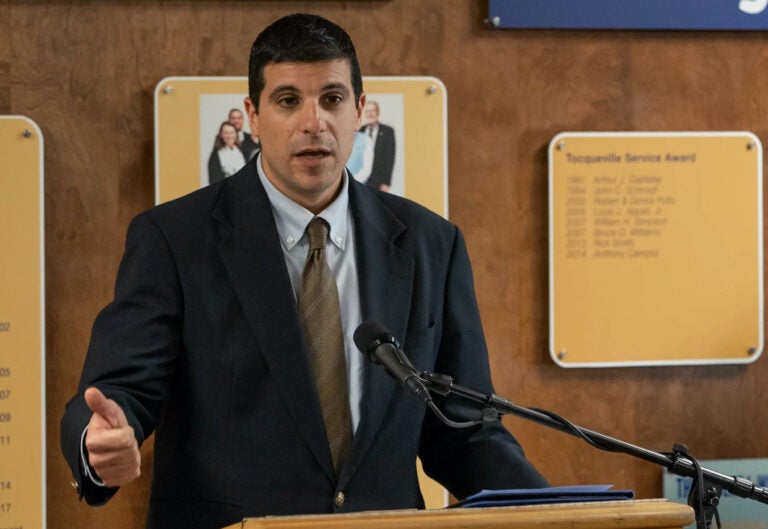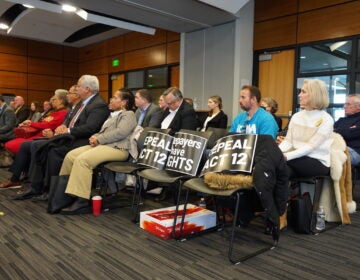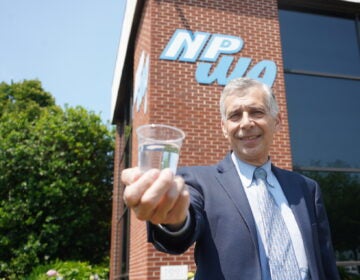Pa. Consumer Advocate resigns, claiming utilities lobbied for his ouster
An investor research firm described Cicero as a “thorn in the side of investor-owned water utilities.” His last day is Jan. 31.
Listen 1:37
File - Patrick Cicero, Pennsylvania's appointed Consumer Advocate (left), in August 2023.
From Philly and the Pa. suburbs to South Jersey and Delaware, what would you like WHYY News to cover? Let us know!
Pennsylvania’s Consumer Advocate Patrick Cicero, who scrutinized the state’s controversial water privatization process and utility rate hikes as is his role, has resigned after incoming Attorney General Dave Sunday said he’d consider other candidates for the position.
Cicero’s resignation, effective Jan. 31, follows months of rumors alleging utilities have pressed the Republican attorney general-elect to replace Cicero, who an investor publication has deemed a thorn in the side of investor-owned water utilities.
In a resignation letter to Sunday obtained by WHYY News, Cicero said no other Consumer Advocate has resigned upon an administration change in the office’s nearly 50-year history. The letter implies Sunday informed him he would have to reapply for his position.
“I had hoped to remain in my position and continue to serve the people of Pennsylvania despite the open, vocal, and public campaign led by various investor-owned utilities to seek my removal,” Cicero wrote.
According to an industry publication, written by the investor research firm Northcoast Research, there was “word on the street” as early as October alleging investor-owned utilities lobbied attorney general candidates to replace Cicero.
“There is no doubt that Patrick Cicero has been a major catalyst in shaking up what has long been a highly favorable Pennsylvania regulatory environment for water utilities by holding out on settlement agreements, appealing PUC decisions to Commonwealth Court, and generally being the most strident representation utility consumers have had in PA for decades,” Northcoast Research wrote to investors in November.
As Consumer Advocate, an independent position within the state Office of Attorney General, Cicero represented ratepayers in cases before the Public Utility Commission and courts. In the three years Cicero has held the position, he opposed some acquisitions of municipal systems by investor-owned utilities, called for repeal of a state law that makes it easier for companies to buy municipal utilities and challenged moves by utilities to raise rates.
1-14-25 Cicero Resignation Letter by WHYY News Digital on Scribd
Days before Cicero submitted his resignation letter, dozens of advocacy organizations and an organization that represents publicly owned municipal water and sewer authorities urged Sunday to keep Cicero as Consumer Advocate. In a letter, the group described the office under Cicero’s leadership as a “bulwark against unreasonable utility policies and proposals.”
In a statement released Wednesday, Sunday, who takes office Jan. 21, said he met with department heads, including Cicero, and informed them he plans to open an application process for positions under his discretion — including Consumer Advocate.
“Mr. Cicero sent a letter indicating his intention to not participate in that process,” Sunday said. “I wish him well in his future endeavors.”
Talk of lobbying against Cicero by utilities
The investor publication speculated Sunday’s win would likely mean a move to a “more moderate” Consumer Advocate.
“We view this as an indicator of the water industry’s strong political influence in Pennsylvania, which is a key factor that has enabled the state to consistently rank among the most attractive states for water utilities to do business,” Northcoast Research wrote.
The letter of support for Cicero includes signatures by the Pennsylvania Municipal Authorities Association, which represents more than 700 municipal authorities statewide, the publicly owned Chester Water Authority, the Pennsylvania Utility Law Project, Community Legal Services and several housing, health and environmental organizations.
In his resignation letter, Cicero said the “utilities’ actions” and Sunday’s decision to open the position to other candidates “cannot be separated.”
“Collectively, they challenge the integrity and independence of the office and erode the public trust in the impartiality of the regulatory process and signal a concerning shift, where public accountability and consumer protection are subordinate to corporate interests,” Cicero wrote.
Sunday’s statement did not directly address these allegations, but said his administration will prioritize “having a capable, unbiased and apolitical” Consumer Advocate to protect the interests of consumers.
“Its work is vital to all Pennsylvanians, especially the most vulnerable among us,” Sunday said. “I look forward to an open and transparent process that includes feedback from all interested parties and individuals.”
A spokesperson for Sunday’s transition team declined to answer questions about whether utilities had asked Sunday to replace Cicero.
Several utilities are represented on Sunday’s transition committee. Members include David Kralle, a registered lobbyist for Peoples Gas, Aqua Pennsylvania and parent company Essential Utilities; David Fisfis, general counsel and vice president of energy policy at Duquesne Light Company; and Carolina DiGiorgio, vice president of government and external relations at PECO.
Sunday is also inviting consumer advocacy organizations to join the transition committee and seeking feedback on what to look for in the next Consumer Advocate, he said in his statement.
Aqua America declined to comment on Cicero’s resignation as well as on Kralle’s participation in Sunday’s transition committee.
In a statement, American Water said it was not involved in the process.
“Pennsylvania American Water is committed to transparency and maintaining the trust of our customers and stakeholders,” spokesperson Gary Lobaugh said in an email. “Pennsylvania American Water has not been involved in any efforts to influence the selection or retention of the Consumer Advocate. Our focus remains on providing reliable and high-quality service to our customers, and we respect the independent processes that govern the appointment of the Consumer Advocate.”
Energy company PECO also said it has not attempted to influence Dave Sunday.
“PECO has not been involved in any effort to influence the AG’s choice for Consumer Advocate,” spokesperson Candice Womer said in an email. “We appreciate the working relationship that we have with the Advocate and his staff and commend him for his dedicated service to the residents of the Commonwealth.”
Duquesne Light did not immediately respond to a request for comment.
A Consumer Advocate who scrutinized the water sale process
Acquisitions of aging municipal water supplies by investor-owned utilities are increasing across the United States and in Pennsylvania as some municipalities struggle to upgrade infrastructure to meet new drinking water standards.
But purchases of municipal systems by companies often come with a higher cost to consumers — something Cicero has not been quiet about. Several states, including Pennsylvania, have passed fair market value laws, which allow companies to factor in the potential future value of a utility when purchasing it, pay above the price and essentially recover the cost of inflated acquisition prices through rate increases.
A Cornell University study of the 500 largest community water systems in the U.S. found that Pennsylvania has some of the highest utility bills following privatization.
Investor-owned utilities often argue privatization is necessary to “save” struggling municipal-owned systems. Though Cicero does not oppose privatization when necessary, he has argued Pennsylvania’s fair market value law allows companies to purchase “perfectly viable” systems for the sake of making more money.
“We are not anti-privatization, and we are not against well-thought-out consolidation and regionalization,” he said during a 2023 state House committee hearing on legislation aiming to amend the state’s fair market value laws. “What we oppose is privatization for its own sake — and privatization and consolidation at any cost or regardless of the cost to consumers.”
On a number of occasions, Cicero has pointed to dramatically increasing water and wastewater costs in Pennsylvania. In fact, fair market value laws have cost consumers more than $85 million more each year than they would have paid without the law.
Cicero’s Office of Consumer Advocate has settled several privatization cases before the PUC, essentially agreeing to allow them to go forward. But he has thrown a wrench in at least two.
In 2023, the Pennsylvania Commonwealth Court sided with Cicero and reversed the Pennsylvania Public Utility Commission’s approval of Aqua Pennsylvania’s purchase of East Whiteland Township’s sewer system for nearly $55 million. Cicero argued the PUC failed to prove the acquisition would provide a public benefit, and that it would raise wastewater costs for thousands of ratepayers.
Early last year, when Pennsylvania American Water applied to the PUC to buy the borough of Brentwood’s sewer system, Cicero urged the commission to approve the application only if it would provide “substantial, affirmative benefits to the public.” He argued PA American had not met its burden of proof that the acquisition would benefit the public interest. The PUC ultimately denied PA American’s acquisition request.
Cicero pushed back against electric and gas rate hikes
PA’s Consumer Advocate routinely gets involved in cases where electric and gas utilities seek to raise rates or charges, urging the Public Utility Commission to deny any increases that companies can’t justify as just and reasonable.
For example, in 2023, when PGW requested to raise the average customer’s monthly bill by $12, OCA filed a complaint expressing concerns. The rate increase the PUC approved later that year was less than a third of what the utility originally sought.
When PECO asked last year to raise the average electric customer’s bill by close to $17 in 2025 and a few dollars more the following year, Cicero wrote to the PUC the proposal would shift risk away from the company and on to its customers. The commission ultimately approved a slightly smaller electric rate increase for PECO.
An independent office
The Pennsylvania Office of the Consumer Advocate was created by the General Assembly in 1976. The Consumer Advocate that leads the office is appointed by the attorney general and confirmed by the state Senate. The position has no term limit.
It’s not common for the position to turn over when a new attorney general takes office. In the nearly five decades since its creation, only seven people have held the role including Cicero, two in an acting capacity.
Only the state’s first Consumer Advocate, Mark Widoff, left the position months after a new attorney general took office. The next five confirmed or acting Consumer Advocates all left the office during the middle or toward the end of an attorney general’s term. Sonny Popowsky was the longest-serving Consumer Advocate in Pennsylvania, from 1990 to 2012.
The appointment and confirmation process is inherently political. But once a Consumer Advocate is in place, it’s important for the office to remain relatively independent from politics so the Consumer Advocate is free to act purely in the interest of consumers, Popowsky said.
“The Consumer Advocate represents the consumers of Pennsylvania — obviously not the utilities,” he said.
Healthy debate between utilities and Consumer Advocates has historically been applauded, said Janice Beecher, a political science professor at Michigan State University and former director of the Institute of Public Utilities.
“It’s a quasi-judicial process. It’s meant to be about fact-finding and deliberation. And while, yes, there is a tension between the utility’s position and other parties and advocates, that’s supposed to be a healthy tension, and it’s supposed to support the process,” said Beecher, who has been vocal about her opposition to fair market value laws.
Beecher added that though Consumer Advocates and the regulatory process should be removed from politics, some issues such as privatization can become partisan. She added that because governors and attorneys general have a right to make appointments, it’s sometimes difficult to take politics out of the process.
However, there are a number of examples of incoming governors and attorneys general who have not sought new people for appointed positions. She pointed to the example of Sonny Popowski.
The Pennsylvania Municipal Authorities Association, which represents more than 700 publicly owned and operated water and wastewater authorities statewide, said it hopes Cicero’s successor will continue to fight for ratepayers’ best interests.
“We are very sorry to see him go,” said Senior Director of Government Relations Jennie Shade. “Patrick has been very effective. But whoever gets put into that role, that person needs to follow the mission of that office — and should be just as effective as any other Consumer Advocate.”
Editor’s Note: This story has been updated to include a comment from PECO.
WHYY is your source for fact-based, in-depth journalism and information. As a nonprofit organization, we rely on financial support from readers like you. Please give today.








